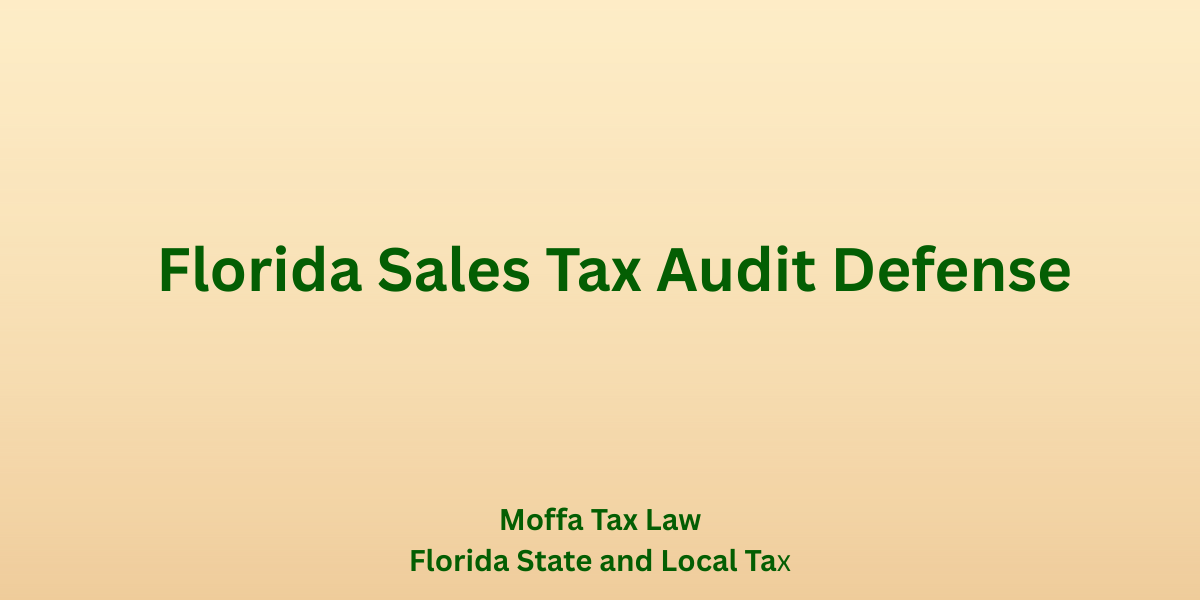NEWS & INSIGHTS


Sales Tax Audits of Adult Entertainment Clubs in Florida
Introduction
Adult entertainment clubs, including strip clubs, gentlemen’s clubs, and cabarets, are frequent targets for Florida sales tax audits. These establishments often operate in cash-heavy environments, offer a mix of taxable and potentially exempt services, and engage in transactions that the Florida Department of Revenue (DOR) closely scrutinizes for compliance. A sales tax audit of an adult entertainment club is not a routine event—it is a high-risk review that can result in significant tax liabilities, penalties, and even criminal referrals. This article provides a comprehensive guide to the audit process, the legal issues at stake, and strategies for building a robust defense.
Why Adult Entertainment Clubs Are Targeted
The Florida Department of Revenue identifies adult entertainment venues as high-risk for underreporting due to several factors:
High volume of cash transactions
Tips and services that may not be recorded in POS systems
Ambiguities in the taxability of certain transactions
Use of independent contractors (e.g., performers) whose treatment can impact tax obligations
Audits often focus on whether taxable services were properly reported, whether exemption certificates were misused, and whether sales and use tax was correctly paid on purchased items.
Common Audit Issues for Strip Clubs and Similar Establishments
1. Unreported or Underreported Revenue
Many adult clubs rely heavily on cash transactions. Auditors will compare reported gross sales to bank deposits, POS records, and other financial data. Any discrepancies—especially if records appear incomplete—may lead to estimated assessments based on assumed underreporting.
2. Taxability of Services
Private dances, table dances, and VIP access fees are generally considered taxable under Florida law as admissions or entertainment services. Clubs that fail to collect and remit sales tax on these services risk significant liabilities.
3. Improper Use of Resale Certificates
Some clubs attempt to use resale certificates for purchases that are not resold to customers, such as furniture, lighting, sound systems, and stage fixtures. If audited, the DOR may assess use tax plus penalties on these items.
4. Use Tax on Out-of-State Purchases
If clubs purchase equipment or décor from out-of-state vendors without paying Florida sales tax, they may owe use tax. The Department routinely reviews invoices and shipping records to identify unreported use tax obligations.
5. Independent Contractor Classification
Many performers at adult clubs are classified as independent contractors. While this classification may be appropriate for employment law purposes, the club may still be responsible for collecting sales tax on fees or commissions associated with performances. Misunderstandings in this area can be costly.
Audit Process: From Notice to Assessment
DR-840: Notice of Intent to Audit
The audit begins with a DR-840 Notice. This formal notification outlines the Department’s intent to examine records. At this point, clubs should immediately retain counsel experienced in Florida sales tax audit defense.
Fieldwork and Records Review
Auditors will request access to POS data, bank records, tip records, contracts with performers, admissions logs, and invoices. If records are incomplete or inconsistent, the Department may use estimation methods to project liability.
DR-1215: Preliminary Audit Findings
This notice provides the club with the Department’s preliminary conclusions. It is critical to respond with detailed objections, legal citations, and alternate documentation. A strong response can significantly reduce the proposed liability.
NOPA: Notice of Proposed Assessment
If disagreements persist, the DOR will issue a Notice of Proposed Assessment. The business then has 60 days to file a formal protest or face final assessment and collection action.
Criminal Exposure
Section 212.15, Florida Statutes, makes the intentional failure to remit collected sales tax a felony. If the Department believes that the underpayment was willful, it may refer the case for criminal investigation. This risk is heightened in industries where cash is prevalent and records are less formalized.
Building a Defense
A successful audit defense for adult entertainment clubs involves:
Working with a Florida sales tax attorney familiar with the industry
Reconstructing missing records from bank data or secondary logs
Clarifying the taxability of each revenue stream
Challenging flawed sampling or extrapolation methods
Demonstrating good-faith compliance to mitigate penalties
Preventing Future Issues
Clubs can reduce audit risk by:
Implementing robust POS systems that track all services and tips
Maintaining signed agreements with performers that outline payment structures
Training staff on taxability and proper use of resale certificates
Consulting with tax counsel to conduct periodic internal reviews
Conclusion
Sales tax audits of adult entertainment clubs in Florida carry unique risks and complexities. From the classification of services to the tracking of cash receipts, every aspect of operations may be scrutinized. By taking a proactive approach and engaging experienced Florida sales tax audit defense counsel, clubs can navigate audits successfully, minimize exposure, and continue operations without disruption.
© 2025 Jeanette Moffa. All Rights Reserved.
Share
Additional Articles by the SALTy Orange at Moffa Tax Law:
Florida Repeals Sales Tax on Commercial Rent — Will DeSantis Sign the Landmark 2025 Tax Cut?
NEWS & INSIGHTS Florida Repeals Sales Tax on Commercial Rent — Will DeSantis Sign the Landmark 2025 Tax Cut? …
NEWS & INSIGHTS Is Bottled Coffee Subject to Florida Sales Tax? The Answer May Surprise You Is Bottled Coffee Subject…
Inside the ABA SALT Committee Meeting: What Tax Professionals Need to Know About the Annual May Conference in D.C.
NEWS & INSIGHTS Inside the ABA SALT Committee Meeting: What Tax Professionals Need to Know About the Annual May Conference…

Jeanette Moffa, Esq.
(954) 800-4138
JeanetteMoffa@MoffaTaxLaw.com
Jeanette Moffa is a Partner in the Fort Lauderdale office of Moffa, Sutton, & Donnini. She focuses her practice in Florida state and local tax. Jeanette provides SALT planning and consulting as part of her practice, addressing issues such as nexus and taxability, including exemptions, inclusions, and exclusions of transactions from the tax base. In addition, she handles tax controversy, working with state and local agencies in resolution of assessment and refund cases. She also litigates state and local tax and administrative law issues.


